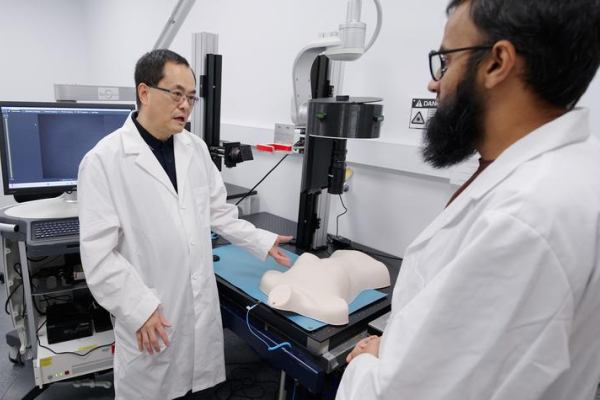‘I am a UK Innovator’: College of Social Work’s Julie Cerel
Innovation is a new way of thinking that can often lead to transformative breakthroughs. Research Communications partnered with UK Innovate to spotlight faculty innovators with pioneering ideas at the University of Kentucky. UK Innovate works collaboratively with innovators to strategically assess, protect and license early-stage technologies and co-create new technology startups.
Julie Cerel, Ph.D., is a professor in the UK’s College of Social Work and director of the Suicide Prevention & Exposure Lab. In this Q&A, Cerel discusses her work on CODE RED Safety Planning — a proactive crisis planning intervention. CODE RED stands for “COntact,” “DElay decisions,” “RElax” and “Distract.” This approach fosters open dialogue and encourages individuals to create a simple, customized safety plan they can access during a crisis.
With more than 100 academic publications and an accomplished career as a clinical psychologist, Cerel uses her expertise and empathy to develop new and innovative ways to help those most at risk.
UKNow: What inspired you to pick this specific area of research?
Cerel: As a suicidologist, most of my career has been focused on helping people left behind after a suicide has occurred. Despite years of research, the suicide rate has not decreased. One myth about suicide is that it is mostly a problem among those with mental health disorders. However, many individuals who die by suicide have no diagnosis at the time of their death. Therefore, I started to think about universal approaches that could help not only those we think of as being at-risk, but could benefit everyone. That was the start of CODE RED.
UKNow: What is the most challenging aspect of your research?
Cerel: With nearly 50,000 deaths annually in the U.S., the scope of the problem can feel overwhelming at times. Learning about the experiences of people who lose loved ones to suicide or are struggling to keep someone they care about alive is humbling and often very sad. Thus, we have to be cautious, caring and sensitive throughout our work. Sometimes it is difficult to strike a balance between operating efficiently so we can help those in need in a timely manner and making sure that we satisfy all required documentation and regulations. We have to ensure we do the best we can and have the greatest impact for the most people.
UKNow: What have been the most fulfilling moments for you regarding your discoveries?
Cerel: Many suicide prevention programs, especially those directed at youth, rarely ask those who are on the receiving end of them what they think about the program itself. When deciding how to evaluate CODE RED, we knew that asking those who participated in CODE RED directly about their experience with it would be a very important part of understanding CODE RED’s impact, especially among our youth participants. The feedback we have received has been overwhelmingly positive. Youth have noted that they found their CODE RED experience meaningful, and that they liked the interactive and the proactive approach of the program. While we still have a lot to learn about how CODE RED is perceived and its impact, this initial data tells us that we are on the right track and are making progress toward an effective universal suicide prevention program.
UKNow: How has your research impacted the way you train students?
Cerel: My work has shown that about half of all adults know someone who has died by suicide and even more know someone who has made a suicide attempt. So when working with students, I emphasize that even if they do not personally know someone who has died by suicide or made an attempt, that they are very likely to encounter someone who does. Compassion and sensitivity are central to this work, and I try very hard to make sure that students understand their importance. I also believe it is very important that students across a variety of disciplines learn about suicide and how they can have an impact in their academic area and future careers.
UKNow: What drew you to and/or inspires you about the University of Kentucky?
Cerel: Although I did not grow up in Lexington, my family has deep roots here. I wholeheartedly believe that Kentucky students deserve a university that not only educates them but also supports them and cares about them. I am fortunate that during my time at UK, I’ve been able to not only pursue my research, but to do it in a way that has benefited Kentucky students. Seeing the impact of our work not only nationally, but locally, has been incredibly rewarding.
More from this series I am a UK Innovator
Video Transcript
I'm Dr. Julie Cerel. I'm a professor in the UK College of Social Work. I'm a licensed psychologist, and I'm director of the Suicide Prevention and Exposure Lab here at UK.
CODE RED is based on the idea that people need safety plans, and it's a universal preventative intervention. Universal means it's for everyone. So, we don't wait until someone is at risk of suicide or has made a suicide attempt—universal—we want everyone to have a safety plan before they have their worst day.
We really stepped back and tried to figure out how many people know someone that have died by suicide first. And we found that half of us in the Commonwealth of Kentucky, and then half of us nationwide and internationally, know someone who's died by suicide. Even more of us know someone who’ve made an attempt. And based on that work, we were able to calculate for every death by suicide, about 135 people are left behind. For every attempt, it's exponentially more than that. And so the idea is, if we can help people and we can reach out to people that we know have been impacted by suicide, then hopefully we'll have a lot less suicide.
I think people are worried that if you raise the issue of suicide, that you're somehow going to put the idea into someone's head. And really, there's been research and just common sense, if someone is so desperate and so willing to think about ending their life—that suicide has come into their mind—it isn't like someone's going to say, “I'm really worried about you. I'm thinking you might be suicidal.” And they're suddenly going to say, “Oh! I hadn't thought of that!” So actually, talking to someone about suicide, planning for a worse day, can actually be protective for people to show them what they can do and that people care about them. The hope is to really show that CODE RED can prevent suicide and reduce the suicide rate both in the Commonwealth and across the country and world.
My name is Dr. Julie Cerel, and I am a UK Innovator.

